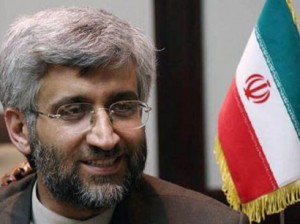 That�s the advice of some nonproliferation experts for the United States and its five partners in negotiations that resume Friday aimed at dissuading�Iran�from building a nuclear bomb.
That�s the advice of some nonproliferation experts for the United States and its five partners in negotiations that resume Friday aimed at dissuading�Iran�from building a nuclear bomb.But with threats of nuclear annihilation emanating daily from�North Korea, the international community�s latitude for making a compromising overture to Iran may be severely constrained.�Kim Jong Un, the erratic young dictator in�Pyongyang, is likely to loom large as both a cautionary tale against letting a rogue state acquire nuclear weapons and an inspiration for Iranian leaders who would like to wield Kim�s menacing clout.
Iran and the six nations of the �P5-plus-1� negotiating forum -- the five permanent members of the U.N. Security Council plus�Germany�-- are gathered in Kazakhstan for the next two days to take another stab at resolving their conflict over Iran�s nuclear programs. The United States and its partners want�Tehran�to renounce enrichment of uranium to 20% purity, a level that can be quickly enhanced to weapons-grade, in exchange for some minor sanctions relief. Iran�s negotiator has hinted of a counterproposal to be unveiled at the meeting in the former Kazakh capital of�Almaty, although few who have been following the talks see much potential for a breakthrough.
Iran has been pursuing nuclear capabilities for half a century, an effort that has cost them a total of about $100 billion, according to a think-tank report published this week. That makes it tough for Tehran to capitulate to demands of the six powers that it drop uranium enrichment without some face-saving tradeoff, the authors warn.
The Almaty meeting is the fifth in the year since the six powers launched a roving ritual of futility in which Iran professes to be developing nuclear energy only for peaceful uses and the other six states accuse Tehran of clandestinely pursuing a bomb. Each of the last four meetings -- in Istanbul, Baghdad, Moscow and a February session in Almaty -- ended with only enough perceived progress to agree to another meeting.
More is at stake than wasted time and travel expenses, two nonproliferation scholars warn in the report issued by the�Carnegie Endowment for International Peace.
�Iran�s Nuclear Odyssey: Costs and Risks,��written by Ali Vaez of the International Crisis Group and Carnegie�s Karim Sadjadpour, explains what the authors see as faulty logic on both sides: impractical expenditures by Tehran on an energy source that it can never independently master, and the foreign negotiators� failure to offer Iran credible inducements to embrace alternatives.
�Economic pressure or military force cannot �end� Iran�s�nuclear program. It is entangled with too much pride -- however misguided -- and sunk costs simply to be abandoned,� write Vaez and Sadjadpour, both veteran analysts of Iran's nuclear programs.
But the drop-it-or-else dictate was still the message being circulated on the eve of the Almaty talks. The Obama administration warned Tehran on Wednesday that it could face intensified sanctions and further isolation unless it offers a �substantive and concrete� response to the six powers� Feb. 26 proposal. That deal called for Tehran to abandon all but the minimal uranium enrichment needed for energy and medical isotopes and to ship its stockpile of 20%-enriched material abroad.
Iran�s supreme leader,�Ayatollah Ali Khamenei, signaled his country�s rejection of that offer last month when, in an Iranian New Year speech, he called for the U.S. to respect his country�s claimed right under the Nuclear Nonproliferation Treaty to enrich uranium for civilian uses. Iran�s negotiator at the talks, Saeed Jalili, reiterated that position Wednesday in an address to Almaty college students just before the current negotiations.
The prospects for another fruitless gathering have only been enhanced by the flurry of bombastic pronouncements from Pyongyang as North Korean leaders whip up hysteria over the annual U.S.-South Korea�military maneuvers off their shores. Kim, thought to be 30 or younger and not known to have much military experience or diplomatic savvy, has vowed to attack U.S. cities with nuclear missiles -- although most analysts doubt North Korea has that ability yet. His government has also unilaterally abrogated the armistice with South Korea that has kept a tense peace on the divided peninsula since 1953, moved a long-range missile to the east coast, boasted of having a warhead light enough to affix to a rocket and issued propaganda photos showing Kim reviewing plans for attacking Hawaii, Guam and the U.S. mainland.
�All of our friends and partners in the Middle East are probably watching how the situation is evolving with North Korea and imagining a nuclear Iran in the future,� said Jeffrey Lewis, director of the East Asia nonproliferation program at the Monterey Institute of International Studies.
Iranian leaders pay keen attention to U.S. relations with its other adversaries and are likely drawing conclusions that will thwart progress at the Almaty talks, Lewis said.
�The Iranians were very clear after Libya fell to say that that shows the difficulty of dealing with the United States. They�re going to be looking at the fact that Libya didn�t have nuclear weapons and got trampled, and North Korea does have nuclear weapons and it�s still there -- the Kims are still in power,� Lewis said.
He added, �though, that pressure also will be intensified on the United States and the other five states --�Britain, France, China, Russia and Germany -- to make sure that Iran doesn�t become the next North Korea.
Whether they can make any headway in the present environment appeared in doubt.
�If you�re the Iranian supreme leader, the lesson you draw,� Lewis said, �is that the United States just can�t bring itself to cut a deal with a government it doesn�t like.�
By Los Angeles Times
The Iran Project is not responsible for the content of quoted articles.










